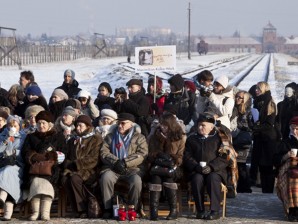Auschwitz survivor dies in Oswiecim on anniversary

Holocaust survivors attend a ceremony at the Auschwitz-Birkenau Nazi death camp on the 67th anniversary of the camp's liberation, in Oswiecim, Poland, Friday Jan. 27, 2012. Survivors and others gather every year to commemorate those who perished on the anniversary of the camp's liberation by the Soviet Red Army on Jan. 27, 1945. (AP Photo/Katarzyna Guratowska)
WARSAW, Poland — Kazimierz Smolen, a 91-year-old Auschwitz survivor who after World War II became director of the memorial site, died Friday on the 67th anniversary of its liberation.
Smolen died in a hospital in Oswiecim, the southern Polish town where Nazi Germany operated Auschwitz-Birkenau during World War II, said Pawel Sawicki, a spokesman for the Auschwitz-Birkenau state museum.
Friday is the anniversary of the camp’s 1945 liberation by Soviet troops. Jan. 27 was designated as International Holocaust Remembrance Day by the United Nations in 2005, and was marked with ceremonies across Europe.
Two years after the war ended, Auschwitz-Birkenau became a museum — and Smolen himself served as its director from 1955-1990. He continued to live in the town after his retirement, often attending the memorial ceremonies marking the camp’s liberation.
Sawicki said soon after Smolen’s death the news was announced to Holocaust survivors commemorating the anniversary in Oswiecim. They fell silent for a minute in his honor.
Article continues after this advertisementSmolen was born on April 19, 1920, in the southern Polish town of Chorzow Stary. He was a Polish Catholic involved in the anti-Nazi resistance who was arrested by the Germans in April 1941 and taken to Auschwitz in one of the early shipments of prisoners there. He left the camp on the last transport of prisoners evacuated by the Germans on Jan. 18, 1945, nine days before its liberation. He later attributed his survival to good health and extreme luck.
Article continues after this advertisementHe once explained his decision to return to the camp to manage it as a way of honoring those who were killed there.
“Sometimes when I think about it, I feel it may be some kind of sacrifice, some kind of obligation I have for having survived,” he said.
In other gestures of remembrance, Norway’s Prime Minister Jens Stoltenberg apologized for his nation’s role in arresting and deporting Jews after it was invaded by Nazi Germany. During the war, 772 Norwegian Jews and Jewish refugees were deported to Germany. Only 34 survived.
He said it’s time the nation acknowledges that politicians and other Norwegians took part and expressed “our deep regrets that this could have happened on Norwegian soil.” He spoke at a ceremony in Oslo attended by the last surviving Jew in a group of 532 deported from Norway in 1942.
In Turkey, state television on Thursday broadcast the epic French documentary “Shoah,” about the mass murder of Jews under the German Nazi regime. It was the first time the film has been aired on public television in a predominantly Muslim country.
“It is a historical event,” filmmaker Claude Lanzmann, 87, said in a telephone interview with The Associated Press from his home in Paris. “It is extremely important that it is being shown in a Muslim country.”
Germany’s Parliament also gathered Friday for a special sitting to remember the Holocaust.
Prominent survivor and literary critic Marcel Reich-Ranicki recalled how the Nazi SS informed members of the Warsaw ghetto’s Jewish council in July 1942 of plans for the inhabitants’ “resettlement” to the east.
Reich-Ranicki, 91, recounted how a “deathly silence” was followed by uproar. He said those present “seemed to sense what had happened: that the sentence had been pronounced for the biggest Jewish city in Europe. The death sentence.”
The Nazis set up the Warsaw ghetto in November 1940, cramming hundreds of thousands of Jews into inhuman conditions. Most who survived disease and starvation in the ghetto were transported to death camps.
___
Associated Press writers Suzan Fraser in Ankara, Turkey, and Geir Moulson in Berlin contributed to this report.